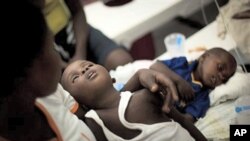Haiti has increased the official death toll from the cholera outbreak that has afflicted the country for more than three weeks.
On Sunday the government said 917 people have died from the disease, and 14,642 cases were admitted to hospitals.
At least 13 cholera deaths have been confirmed in Haiti's capital, Port-au-Prince. Health workers fear an explosion of the disease in the crowded city, where hundreds of thousands of people have been living in tent cities since January's devastating earthquake.
The United Nations released information Friday about a new strategy to help Haitian authorities fight the further spread of the disease.
The strategy includes public outreach, rapid response, access to health services, and ensuring clean water, sanitation and waste management. To fund the effort, the U.N. is appealing for about $164 million in aid.
The U.N. says the response strategy includes projects from 42 non-governmental agencies, five U.N. agencies and the International Organization for Migration. Haiti's Ministry of Public Health and Population would continue to lead the effort.
The United Nations anticipates as many as 200,000 people will show symptoms of cholera in Haiti, ranging from mild cases of diarrhea to the most severe dehydration.
The World Health Organization says the bacteria that causes cholera will be in the country for a number of years, and the goal is to reduce the public health impact of the outbreak. WHO spokesman Gregory Hartl says the current fatality rate of 6.5 percent is far higher than it should be.
Haiti's Health Ministry has said the vast majority of the deaths and hospitalizations have come in the more rural north and central provinces. The outbreak was first reported in the Artibonite region north of the capital.
Cholera is spread through contaminated food and water. It causes vomiting and diarrhea, and can quickly lead to severe dehydration and death.
Some information for this report was provided by AFP and Reuters.




